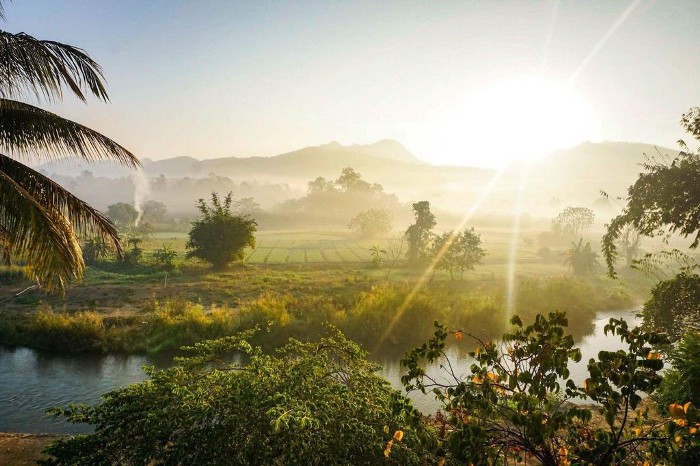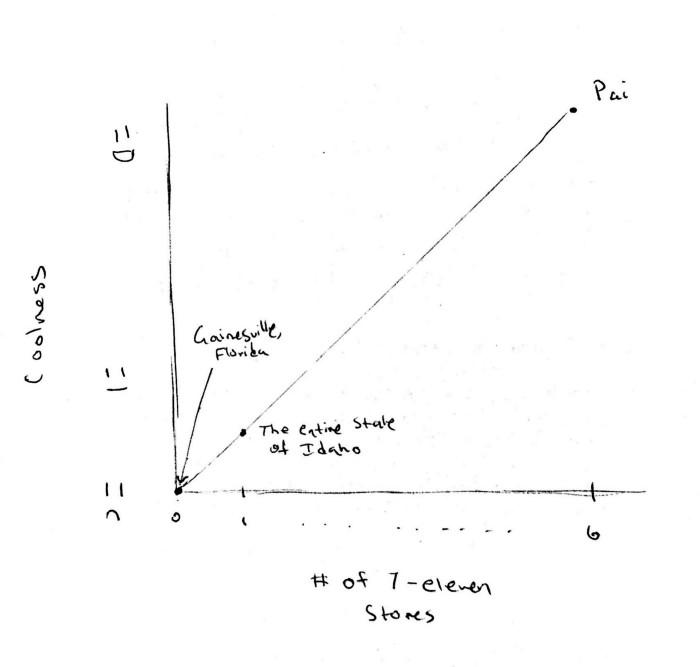🐘 Nirvana in Thailand
July 26, 2019 • 6 min read
An experiment in solitude and mindfulness during a trip to the beautiful city of Pai, Thailand.
Disclaimer: I was going to write this as a satire piece poking fun at the wanderlust travel subculture but after this adventure, I genuinely feel like there’s something for me to explore in writing, so instead I am going to try and earnestly distill my experience into useful substance.

Pai is an interesting place, to say the least. Twenty years ago, the remote village in northern Thailand was nothing more than a small outpost inhabited by a few indigenous groups, sewn together by mountains, rice fields, and the flourishing Pai river. These days, it’s a tourist mecca and draws in backpackers who seek good vibes amongst the cheap guesthouses, healthy street food, and eclectic crowd. In fact, there are SIX 7-eleven convenience stores, ranking it high on my very unscientific scale for measuring the appeal of a location.

Cmon Gainesville…
Convenience stores aside, there was definitely an energy to Pai that I viscerally felt but just could not put into words. I spent three days there towards the end of my post-grad travels and during that time, implemented a physical and digital detox, which was unlike anything that I have experienced before. At the expense of sounding extremely pretentious, I would parallel it to how a modern-day Thoreau on Walden Pond would’ve felt.
The Detox
I wanted to see what would happen if I cut out a bunch of things that probably mean no harm but also, even if only slightly, light up the dopamine receptors in my brain. This means:
- no physical consumption other than food and water (including no caffeine, alcohol, Advil, etc.)
- no ‘digital feeds’ (music, social media, posts, messaging, etc.) save for an open WhatsApp line in case of emergencies
- bare minimum phone usage — I only used my phone for maps, logistical problem solving, and to prove a point once (oops)
I kept a small journal that I wrote in during the 3 days where I wrote everything from my immediate feelings to the frustrations I had to my goals and musings about life. Here is my experience of each day:
Day 1
Friday, July 5. I started the morning off by planning the next three days in my journal and tried to lasso the ambiguity of the experience into something manageable. My guesthouse was a fifteen-minute motorbike ride from the city so by gaining the tranquility of the countryside, I lost the convenience of a short walk to the city. Nevertheless, I willed myself to make the trek and settled into a nice groove of reading and writing at a cafe called Art in Chai.
It was 2 pm and I still had the whole day ahead of me but was already bored with my cafe activities. This wasn’t going to be easy. I decided to pack my stuff up and distract myself with some physical exercise at a nearby gym, which cost around $2 for a day-pass. After that, I went to a nice spa for what was, easily, the best massage of my entire life. STILL ONLY 5 pm!
My biggest takeaway from this day was that time moves much slower when you’re not constantly distracted by jolts of easily digestible information. I had to look for things to do, which was quite a contrast from being neurotically stressed out all the time. In fact, it felt kind of nice!
Day 2
Saturday, July 6. I had signed myself up for a full-day tour through the main tourist destinations in Pai and boarded a rickety old tour van with a bunch of other bright-eyed tourists at dawn. I met travelers from Andorra, Israel, and even Canada on this van and found myself drawn to hearing stories from their lives. I was much more present in conversation than usual and I am pretty sure it had something to do with the fact that I couldn’t retreat to the comfort of my social media following or Messenger conversations if the exchange got stale.
The van seemed to lack shock absorbers, while the roads we took seemed to lack any regard for the squeamishness of western stomachs. My normal reaction to this condition would be to pop my Airpods in and blast some John Mayer with my eyes closed, but I was unfortunately disposed to nothing but my own mind. So, I retreated into my thoughts and focused on regulating my breath. The torturous hour went by quicker than expected and left me with quite a sense of accomplishment and peace.
Day 3
Sunday, July 7. It was already the final day of my experiment and to be honest, time went by much quicker than expected. This day was similar to the first in that it involved lots of writing and reading. One thing that I noticed this day was that I ate a lot more food than I usually do and found myself eating even when I wasn’t hungry, just because I enjoyed the taste and experience of eating something delicious. It seems that my dopamine receptors had re-wired to reward me more for eating something nourishing (you know, kind of like how they’re supposed to work).
After my day died down and I sat in bed, thinking about the prospect of returning to my regular life the following day, I felt this strange feeling start to envelop my mind which had previously been clear and uncluttered. As I thought about all of the planning I needed to do, the messages I would need to reply to, and mental tangents to be had, I felt simultaneously excited and stressed which amounted to something that I could only describe as a fog of anxiety. I realize now that this is my daily, hyperconnected existence which I had grown accustomed to.
The Aftermath
The day after, I was quite excited to re-download all my social applications and catch up on everything. I was pleasantly surprised to realize that I honestly hadn’t missed much. The world moves on with or without you, and that was a calming realization to have. Don’t get me wrong, I was VERY happy to be back on the grid and everyday things such as texting my family or hearing my girlfriend’s voice made me appreciative that we have tools that enable our hyperconnection with the world. Again, it’s just a matter of knowing how to use these tools and not be used by them.
Of course, given my current situation in life as a young professional beginning his career in technology, it’s certainly not practical to fully renounce technology. However, this experience has given me some insight into the mechanism that seems to convert our cognition into engagement and stress. I will be doing more of these experiments and continue to explore the fine line between being empowered by technology and being employed by it.
